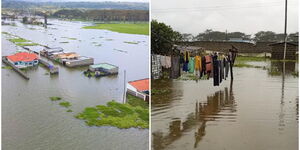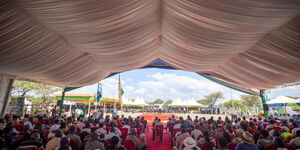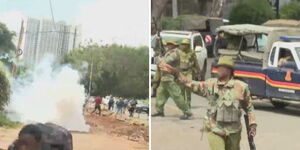Wiper leader Kalonzo Musyoka was told by Taita Taveta County Governor Granton Samboja not to visit the county without involving him and other county leaders.
The governor and six lawmakers including Naomi Shaban (Taveta) and Jones Mlolwa (Voi) maintained that Kalonzo was welcome to the region but should ensure that elected leaders were involved in the preparation of his visit to a troubled settlement scheme in Taveta.
Their remarks come barely a fortnight after armed policemen barred Makueni governor Kivutha Kibwana, Senator Mutula Kilonzo Jr, former Machakos Senator Johnstone Muthama, former Kibwezi MP Kalembe Ndile and other Wiper Party leaders from addressing squatters there.
On their part police stated that the meeting was cancelled at the eleventh hour due to security reasons.
[caption caption="From right: Taita-Taveta Senator Jones Mwaruma, Governor Granton Samboja, Taveta MP Dr Naomi Shaban and her counterpart in Voi Jones Mlolwa "] [/caption]
[/caption]
“My party boss (Kalonzo) has announced that he plans to visit the squatters who have been evicted from Sir Ramson land," Samboja, a member of the Wiper party stated.
"As he plans to come, he should know that the county has its own leadership that must fully be involved and respected. If the Wiper Party boss fails to do so then he is not welcome in the region,” he warned.
Dr Shaban noted that leaders from outside have been making frequent inroads to the county without involving elected leaders.
Kalonzo had announced he would soon visit thousands of squatters who were evicted from the disputed Sir Ramson land, formerly owned by the Kenyatta family, and distribute relief supplies.
Squatters claimed that land allocation at the scheme was biased to benefit undeserving people and this had led to clashes with police which have led to deaths and destruction of property.
[caption caption="Wiper leader Kalonzo Musyoka with Governor Samboja"] [/caption]
[/caption]
Kenyatta family donated the 2300 acres of land in 2013 to be distributed to the landless who were opposed to the establishment of the Ziwani Settlement Scheme.












